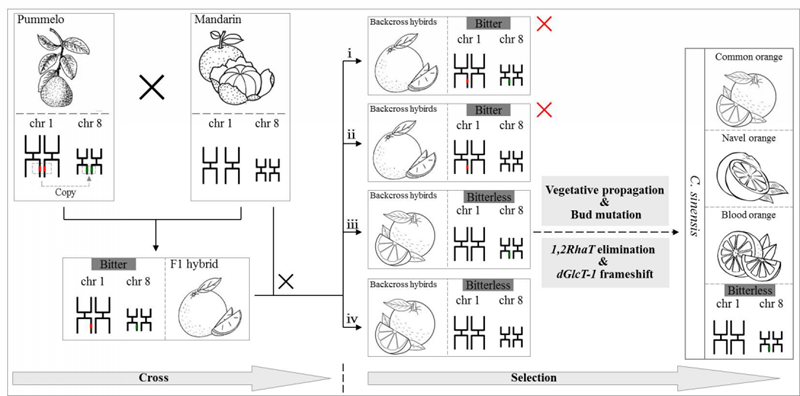
Recently, Journal of Experimental Botany online published a paper titled “Cit1,2RhaT and two novel CitdGlcTs participate in flavor-related flavonoid metabolism during citrus fruit development” by Xu Juan’s team from College of Horticulture & Forestry Sciences of HZAU. The report unveils the key genes controlling the accumulation of glycoside that induce the primary bitterness in citrus. It lays a theoretical foundation for analyzing the cause and evolution of primary bitterness in citrus during domestication.
Neohesperidoside causes primary bitterness in citrus and its accumulation varies with different citrus germplasm. By studying 50 citrus multispecies and two citrus hybrid groups, it is found that 1,2RhaT in citrus and trifoliate orange has direct bearing on the accumulation of neohesperidoside. Through bioinformatics analysis, the authors find that in addition to 1,2RhaT genes, there are two types of 1,2RhaT-like genes in citrus genomes, and 1,2RhaT and 1,2RhaT-like are highly homologous. Sequence comparison and evolutionary analysis show that1,2RhaT and 1,2RhaT-like may be linked in terms of replication and evolution, while the enzyme encoded by the latter only catalyzes the synthesis of thebitterlessflavonoid-7-O-di-glucosides, but not flavonoid neohesperidoside, which is of great significance for revealing the domestication process of taste in citrus fruit. Therefore, the authors think that the deletion and functional mutation of 1,2RhaTcan lead to the evolution of the flavor-related flavonoid metabolism, which may originate from human selection. This research will provide insight into how to develop molecular markers to screen, identify and selectively breed bitterless or fine weak-bitter citrus germplasm.
Funded by the National Natural Science Foundation of China, this research was finished by researchers from Xu Juan’s Lab of College of Horticulture & Forestry Sciences of HZAU. Chen Jiajing and Yuan Ziyu are co-first authors of the paper. Professor Jia-Long Yao, senior scientist from the New Zealand Institute for Plant and Food Research Limited, and Professor Xu Juan are co-corresponding authors.
Source: http://news.hzau.edu.cn/2019/0322/53796.shtml
Translated by: Li Zhen
Supervised by: Xie Lujie